 MyDogBreeds
MyDogBreeds Black Norwegian Elkhound is originated from Norway but Rottweiler is originated from Germany. Black Norwegian Elkhound may grow 20 cm / 7 inches shorter than Rottweiler. Black Norwegian Elkhound may weigh 40 kg / 88 pounds lesser than Rottweiler. Black Norwegian Elkhound may live 4 years more than Rottweiler. Black Norwegian Elkhound may have less litter size than Rottweiler. Both Black Norwegian Elkhound and Rottweiler requires Low maintenance.
Black Norwegian Elkhound is originated from Norway but Rottweiler is originated from Germany. Black Norwegian Elkhound may grow 20 cm / 7 inches shorter than Rottweiler. Black Norwegian Elkhound may weigh 40 kg / 88 pounds lesser than Rottweiler. Black Norwegian Elkhound may live 4 years more than Rottweiler. Black Norwegian Elkhound may have less litter size than Rottweiler. Both Black Norwegian Elkhound and Rottweiler requires Low maintenance.
 The Black Norwegian Elkhound was first bred in Norway in the early part of the 19th century as a smaller version of the Grey Norwegian Elkhound. The Black version is a Spitz and is very seldom seen anywhere in world but Norway. He is designed for the same job that the Grey Norwegian Elkhound performed. The difference is that the Black Norwegian is smaller, easier to see in the snow and ice of Norway and smaller than the Grey. It is a hunter, a herder, a guard dog and a watch dog. Because of the temperatures in Norway it was very important to have a hunting dog that was able to deal with the cold, the snow and the heavy fall rains in Norway and Scandinavia. The Black Norwegian Elkhound is a powerful and prideful dog. Much more so than the grey, he is independent and strongminded. It is highly intelligent and is one of the most ancient of breeds. He is more durable and more quarrelsome than his cousin the Grey Norwegian Elkhound or the more familiar Swedish Elkhound.
The Black Norwegian Elkhound was first bred in Norway in the early part of the 19th century as a smaller version of the Grey Norwegian Elkhound. The Black version is a Spitz and is very seldom seen anywhere in world but Norway. He is designed for the same job that the Grey Norwegian Elkhound performed. The difference is that the Black Norwegian is smaller, easier to see in the snow and ice of Norway and smaller than the Grey. It is a hunter, a herder, a guard dog and a watch dog. Because of the temperatures in Norway it was very important to have a hunting dog that was able to deal with the cold, the snow and the heavy fall rains in Norway and Scandinavia. The Black Norwegian Elkhound is a powerful and prideful dog. Much more so than the grey, he is independent and strongminded. It is highly intelligent and is one of the most ancient of breeds. He is more durable and more quarrelsome than his cousin the Grey Norwegian Elkhound or the more familiar Swedish Elkhound.
Ancestors of the Black date back to the first days human kind went hunting around 4000-5000BC. There have been skeletons of dogs very much like the Black Norwegian Elkhound found that dated back to that time period. They hunted and guarded for the Vikings and pulled sleds as well. They hunted deer, moose, badger, elk, mountain lions, bears, wolves, lynx, rabbit and reindeer. They are trackers who hold their quarry at bay by barking until the hunter can find them. Today they serve as loved family pets and guard dogs. In a National Emergency the leader of Norway can call up all the privately-owned elkhounds of any kind and assign them to work in a variety of sledding duties. Within the FCI, the Black Norwegian Elkhound is classified as a primitive Nordic hunting dog.
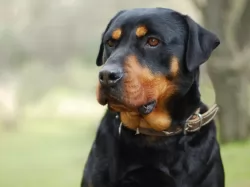 It is beleived to be the Rottweiler has been developed from the Roman cattle dogs. The Roman empire made a camp in a place at Germany in 74 AD. The area was called as 'das Rote Wil' and later as 'Rottweil'. In the middle ages Rottweiler was used in bear hunting and as a cattle dog. In 1899 the International club for Leonbergers and Rottweiler dogs was formed in Germany. In 19th century due to set in of railways the cattle was moved by railways and the need for the breed declined. When the world war was set in there came a heavy demand for police dogs. Rottweilers played a major role in first and second world war.
It is beleived to be the Rottweiler has been developed from the Roman cattle dogs. The Roman empire made a camp in a place at Germany in 74 AD. The area was called as 'das Rote Wil' and later as 'Rottweil'. In the middle ages Rottweiler was used in bear hunting and as a cattle dog. In 1899 the International club for Leonbergers and Rottweiler dogs was formed in Germany. In 19th century due to set in of railways the cattle was moved by railways and the need for the breed declined. When the world war was set in there came a heavy demand for police dogs. Rottweilers played a major role in first and second world war.
In 1921 many German Rottweiler clubs joined together to form ADRK, which is Allgemeiner Deutscher Rottweiler Klub. This is said to be the home club of Rottweiler. American kennel club recognised them in 1931. They become 9th most popular breed in America in 2013.
 The Black Norwegian Elkhound is a short compact Spitz with dark eyes and a curly tail. It is the coat that sets this dog apart. It is an all-weather coat suitable for the cold, the snow and the rain of Norway. Ears are pointed and erect while the head is wedged and broad. His head is almost like that of a wolf. Its body is strong and compact. Its coat is coarse, short and double. He has a broad black nose with a straight bridge and with black lips and dark brown oval eyes. His legs and withers are strong boned and powerful with well padded feet to protect it from the freezing temperatures of Scandinavia.
The Black Norwegian Elkhound is a short compact Spitz with dark eyes and a curly tail. It is the coat that sets this dog apart. It is an all-weather coat suitable for the cold, the snow and the rain of Norway. Ears are pointed and erect while the head is wedged and broad. His head is almost like that of a wolf. Its body is strong and compact. Its coat is coarse, short and double. He has a broad black nose with a straight bridge and with black lips and dark brown oval eyes. His legs and withers are strong boned and powerful with well padded feet to protect it from the freezing temperatures of Scandinavia.
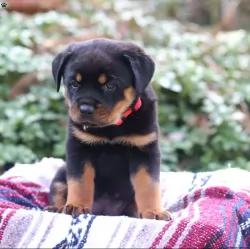 Rottweilers are good natured, obedient and are very much eager to work. They are calm, confident and an excellent watchdog. They will not make friends immediately. Rottweilers can be said as an all purpose dog since they are suitable as companion and watch dog as well. He is good in herding and guarding as genital feature. Rottweiler must be trained from its younger stage and should not be hit while training. They have high energy level and thus they are interested in doing work if properly trained. There are more possibilities of biting the strangers because of watchdog tendency.
Rottweilers are good natured, obedient and are very much eager to work. They are calm, confident and an excellent watchdog. They will not make friends immediately. Rottweilers can be said as an all purpose dog since they are suitable as companion and watch dog as well. He is good in herding and guarding as genital feature. Rottweiler must be trained from its younger stage and should not be hit while training. They have high energy level and thus they are interested in doing work if properly trained. There are more possibilities of biting the strangers because of watchdog tendency.
They are very good in herding sheeps as they have a natural gathering style. They are clever and adjusts the barking sound according to the situation. While herding they used to prove the leadership by selecting the dominant one in the flock and challenging it. If they were made to watch a same flock of cattle regularly, then they will develop a bond with them and will be affectionate with them as long as the cattle obeys its commands.
 This dog was made for families. He loves children and is not a one person dogs. He gets attached to everyone in the family. However, he is smart and stubborn. He loves to join in with whatever the family is doing but he does it to please himself not his owner. He loves, loves, loves to play and has the stamina to do so all day long. He is agile, bold, independent, strong, curious and loyal. His loyalty can be territorial, and he can become protective of his home and his family. This makes him an excellent watchdog until your friends come to visit and he won’t let them in the house. You need a high fence to keep him safe in your own yard and away from strangers and even guests till he gets to know them.He tends to be dominant and aggressive with other dogs. They also have strong hunting instincts.
This dog was made for families. He loves children and is not a one person dogs. He gets attached to everyone in the family. However, he is smart and stubborn. He loves to join in with whatever the family is doing but he does it to please himself not his owner. He loves, loves, loves to play and has the stamina to do so all day long. He is agile, bold, independent, strong, curious and loyal. His loyalty can be territorial, and he can become protective of his home and his family. This makes him an excellent watchdog until your friends come to visit and he won’t let them in the house. You need a high fence to keep him safe in your own yard and away from strangers and even guests till he gets to know them.He tends to be dominant and aggressive with other dogs. They also have strong hunting instincts.
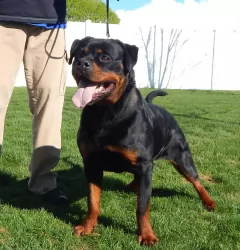 They are friendly with children and enjoy the company with them. But it is not advised to leave them with children without adult supervision.
They are friendly with children and enjoy the company with them. But it is not advised to leave them with children without adult supervision.
Rottweilers do not make friends immediately but take time to know about new people. He is an excellent watchdog. Males are quiet in nature but are watchful and females are more affectionate and obey some more. A good training is required for them to obey your orders.
They are not good for apartment life and thus a fenced back yard will be better for them to play and spend the energy. They require companion and will be happy to walk around with you. Hot weather will be some what better for them when compared with cold.
Rottweilers are easy to train because of their high intelligence. The training should be started in their young stage to have best results. They should not be dominated but treated kindly with understanding. They should be comfortable with the surroundings and people. Giving him a reward for training will make him interested in doing it. If he does a mistake then he should not be hit, so that he may get fear and loss his interest in doing it. Punishments will never work for them but rewarding will make him encouraged. Simple commands such as sit and stand shall be taught to them.
 The Black Norwegian Elkhound is a strong and hardy dog, though he is susceptible to some of the problems many breeds face. These include issues with luxating patella, optical entropion, hip dysplasia, hypothyroidism, and Fanconi syndrome. The most serious of these is the Fanconi Syndrome which is an abnormal functioning in the tubules of the kidneys. This can be a life-threatening situation.
The Black Norwegian Elkhound is a strong and hardy dog, though he is susceptible to some of the problems many breeds face. These include issues with luxating patella, optical entropion, hip dysplasia, hypothyroidism, and Fanconi syndrome. The most serious of these is the Fanconi Syndrome which is an abnormal functioning in the tubules of the kidneys. This can be a life-threatening situation.
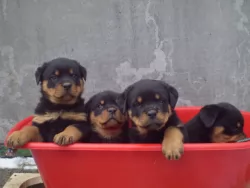 The health issues affecting the eyes of them are Cataract and Progressive Retinal Atropy. Health problems common in their joints are Hip Dysplasia, Elbow Dysplasia and Panosteitis. They also have chances to get circulatory system problems like Aortic Stenosis and Von Willebrand's Disease. Other common health problems in Rottweiler are Bloat and Cancer.
The health issues affecting the eyes of them are Cataract and Progressive Retinal Atropy. Health problems common in their joints are Hip Dysplasia, Elbow Dysplasia and Panosteitis. They also have chances to get circulatory system problems like Aortic Stenosis and Von Willebrand's Disease. Other common health problems in Rottweiler are Bloat and Cancer.
Mostly people think that Rottweilers don't shed but they are short haired dog and sheds more. They are having double coat that is undercoat and topcoat. The undercoat is softer and protects them in winter and topcoat is rougher and visible. It is said that they will shed in spring and winter seasons. Shedding can be reduced by brushing them.
 This is an energetic active dog, or she should be. Feed her high nutritious food twice a day. Do not overfeed.
This is an energetic active dog, or she should be. Feed her high nutritious food twice a day. Do not overfeed.
The most potentially troublesome health issue is Fanconi Syndrome. This kidney disorder can impact the of the body’s absorption of electrolytes, water and nutrients. These nutrients include Sodium, Potassium, Glucose, Phosphate, Amino Acids and Phosphate
The Black Norwegian Elkhound loves to play, and they love to work. Exercise is vital, but it must be one of those two things – play or work. Don’t leave him alone to figure it out for himself or you wont like what this intelligent dog decides to do. She needs a large yard, a long walk daily but jogging with you is even better. Make him heel when on leash or he will think he oversees you. These are roaming dogs who will follow a scent anywhere and ignore your commands for her to come to you. They are better off on a leash unless you are in a dog park or a fenced yard.
The Black Norwegian Elkhound is great at all dog athletics, games and sports such as agility, rally obedience, flyball, tracking, herding.
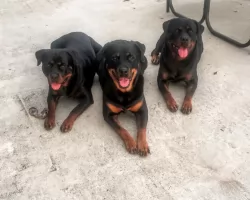 Rottweiler puppies should be given a diet which has protein, carbohydrates and fats. They need different diets in their growing stages. They can be given chicken with bones and vegetables for 4 days in a week. Beef with vegetables can also be given. When feeding them red meat a raw meaty bone can also be included. Fish oil can be given such that starting with 1000 mg and making it to 3000 mg in a time of two weeks.
Rottweiler puppies should be given a diet which has protein, carbohydrates and fats. They need different diets in their growing stages. They can be given chicken with bones and vegetables for 4 days in a week. Beef with vegetables can also be given. When feeding them red meat a raw meaty bone can also be included. Fish oil can be given such that starting with 1000 mg and making it to 3000 mg in a time of two weeks.
High calories of protein should be provided to them to meet their energy requirements. While buying commercial food it should be checked for the main ingredient to be meat. Protein levels should be more from animals than vegetables. High quality dairy products should be included. Food should not have low quality flavours and preservatives. Healthy fat is necessary for their skin and coat. If these fats are not provided it will cause dandruff and itchy skin.
Brushing them weekly once is recommended for their coat and skin. Buying the puppy from reputable breeder will be better. Vaccinations and preventive medicines should be given on right time. Spaying and Neutering should be done to avoid unwanted pregnancy. High quality diet should be maintained. Making them to bath once in a week is advisable. Nails should be trimmed once in every two weeks.
Rottweilers like to chase something and Laser pointer will be a good game for them. It will make them busy and also entertain us. But it should be on a limit and they should not get bored. A treat or toy can be hided and they can be made to find it. A bottle should be filled with water and frozen. The frozen bottle can be given to them for playing. In summer time it will make them very happy to play with it. A ball or toy can be thrown and they can be made to fetch it. Walking them is also a good exercise.